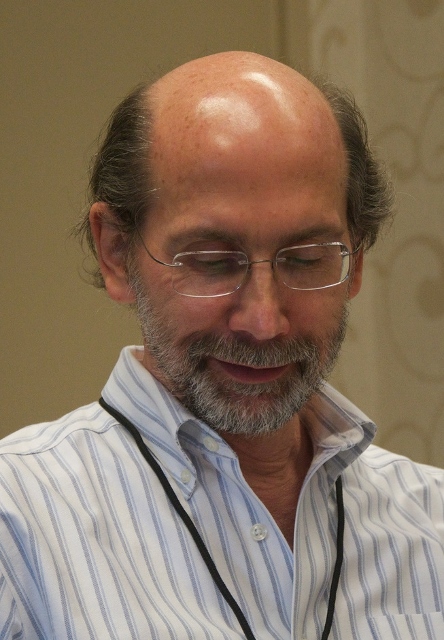|

Elena Shvidko
|
|

Tony Silva
|
Tony, how long have you been in the field?
Since about 1981, when I started working as the writing and
grammar component leader at the Intensive English Institute at the
University of Illinois. As a professor, I’ve been in the field since
1991.
What do you think was a defining moment in the field of second language (L2) writing?
I think it was about 1990 or so when Barbara Kroll’s book
[Second Language Writing: Research Insights for the
Classroom] was published. The reason I say this is because when I
look back on it, I think up until 1990 there really wasn’t much of an
organized field. There were a few people doing work in L2 writing, but I
think with this collection and also a couple years later with the The Journal of Second Language Writing emerged a critical mass of L2
scholars, and the field started to have an identity. Personally, it was
important for me too because I was finished with my PhD in 1990. Before
that it was pretty hard to get work published on second language
writing because people in mainstream journals weren’t interested in the
second language part, and people in ESL journals weren’t much interested
in writing per se.
What was unique about this book that it helped define the field?
It was a collection of pieces that were all focused squarely on
second language writing. There were some previous collections that had a
few articles on second language writing as part of a larger work, but
this book also picked up people who were active in the field and put
them together between two covers.
Where do you see the field in, say, 10 years?
I think maybe what’s going to happen in the future is that
there will be an organization dedicated primarily to second language
writing, as there is no professional organization now. I see the field
continuing to grow because I don't imagine there is going to be less
demand. In the United States at some point we are going to lose part of
this population. In other words, China keeps sending us thousands of
students per year, but at some point that’s going to stop. Countries do
this for a while, and then they develop what they need back home and
people no longer have to go and get degrees somewhere else. Maybe that
will mean fewer students, but I think it’ll probably just mean students
from another place—that’s the way the history has been. But there is
still a lot of room to move because there isn’t much done on writing in
other languages than English as a second language. I don't know if that
will happen quickly or slowly, but I think it’s probably moving in that
direction. I would also expect that the field of L2 writing will
continue to grow in the future.
What kinds of L2 research or issues excite you the most right now?
What I am interested in now is looking at the economic and
political forces that shape what happens with international students in
the United States. I don't know if that’s necessarily directly related
to L2 writing, but it’s related in the sense that most of these students
come to the United States and end up in a writing class. What I am
really interested in is in the United States, 70% of the students who
graduate from college graduate from state colleges, and since 1980,
state colleges’ funding has been going down drastically. It used to be
that the state would pick up three quarters of it, and the student would
pay about a quarter, but now it’s reversed. I mean, you are lucky today
if the state supports 25%. To try to address this, schools are heavily
recruiting international students. Unfortunately, they are not always
doing it in an ethical way. In other words, a lot of places are working
for bodies to fill seats to pay tuition. Because of a lack of money,
some schools are heavily recruiting, but they don't care much about who
they are recruiting. They recruit sometimes students whose proficiency
level guarantees that they would fail. The decrease in state funding has
also brought a lot of privatization and outsourcing, and it can be
profitable only if you run it with teachers whom you don't pay very
well, and often teachers whom you don't pay very well don't have very
good qualifications. So to make the long story short, I see some
deprofessionalization.
From your perspective, what is the biggest challenge in teaching L2 students?
I don't see it as a challenge really; I see it as an
interesting and fascinating opportunity to work with people from all
over the world. The job is sometimes a challenge because, as I said
before, there continues to be the increase in the number of students
with less support, and that makes things a little more hectic. I think
my challenge has been to try to do my job in a complete way by doing
research, teaching, and being engaged in professional organizations, but
that’s challenging in terms of time and focus. Sometimes there have
been opportunities that I haven’t taken advantage of because I just
didn't have the time, or there are some things that I wish I would have
done better. Nevertheless, I feel very lucky to work with both graduate
and undergraduate students and find it very motivating.
What general advice would you give to those people who start teaching L2 students?
Don’t be afraid of it, and don’t see it as a difficulty. I
mean, you can see it as a challenge, because it is a challenge, but it
is one that you might find enjoyable. Interestingly enough from my
experience with professional organizations and the field, most people
feel that way, and people are excited about what they do, maybe not
because of how much they are paid or their status at the universities
and places like that, but because they are interested. If you want to
make money, you can get an MBA or something else, but if you want to
interact with a very interesting multilingual and multicultural
international population, that’s the place to be.
References
Kroll, B. (1990). (Ed.). Second language writing: Research
insights for the classroom. Cambridge: Cambridge University
Press.
Elena Shvidko is a doctoral candidate in the
Department of English at Purdue University, where she also teaches
first-year composition courses. She received her master's degree in
TESOL and has taught English in both academic and community
contexts. | 
